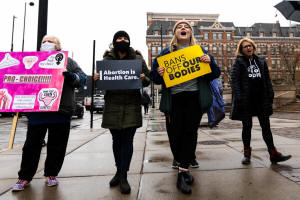Judge blocks South Dakota rule that hinders medication abortions
 Send a link to a friend
Send a link to a friend
 [January 27, 2022]
(Reuters) - A federal judge in South
Dakota temporarily blocked on Wednesday a new rule by the state's health
department that makes access to a medication abortion more difficult. [January 27, 2022]
(Reuters) - A federal judge in South
Dakota temporarily blocked on Wednesday a new rule by the state's health
department that makes access to a medication abortion more difficult.
Planned Parenthood sought the injunction against the South Dakota
measure, which was first part of an executive order issued last
September by Governor Kristi Noem, a Republican.
Judge Karen Schreier wrote in her ruling that Planned Parenthood had
shown that South Dakota had created a "substantial obstacle" in the path
of women seeking medication abortions.
Noem's executive order mandated that the two drugs used in mediation
abortions both be administered by a medical provider. Typically, a woman
would receive the first medication at a provider's office, and be handed
the second drug at the same time, with instructions to take it 24 to 72
hours later.
Because Planned Parenthood's office in Sioux Falls is the only one that
provides abortions in the state, and because many women travel long
distances to reach its office, forcing them to make repeat visits could
put an undue burden on many women, the judge wrote in her restraining
order.

[to top of second column]
|

Supporters of Planned Parenthood Ohio chant at a pro-choice rally as
the United States Supreme Court justices hear arguments in the
Mississippi abortion rights case Dobbs v. Jackson Women's Health, in
Cincinatti, Ohio, U.S., December 1, 2021. REUTERS/Megan Jelinger
 The legal battle over abortion in
the United States has grown increasingly tense in recent months. In
December, the Supreme Court, with a 6-3 conservative majority, heard
arguments in Mississippi's bid to revive its 15-week ban on
abortions.
Conservative justices indicated then that they are open to either
gutting or overturning entirely Roe v. Wade, the 1973 case that
established a woman's right to terminate her pregnancy before the
fetus is viable. A decision is due by the end of June.
In December, the federal government permanently eased some
restrictions on medication used in abortions for up to 10 weeks of
pregnancy, allowing the drug to be sent by mail rather than
requiring it to be dispensed in person. However, 19 states have laws
that supersede the FDA decision by barring telehealth consultations
or mailing of abortion pills.
(Reporting by Brad Brooks in Lubbock, Texas; Editing by Robert
Birsel)
[© 2022 Thomson Reuters. All rights
reserved.] This material may not be published,
broadcast, rewritten or redistributed.
Thompson Reuters is solely responsible for this content. |